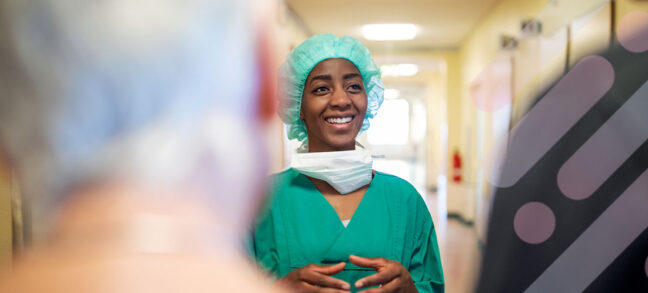As we turn over a new year, it’s a natural time for reflection, self-improvement and resolutions. If you’re a breast cancer or BRCA thriver, this New Year’s tradition may look a little different than it did before your diagnosis.
The journey through surgery, recovery and reconstruction tends to change our perspective on life in general. While friends may be promising themselves that this is the year they run the marathon, you may simply be focused on getting your strength back. Instead of reading your way through the classics, you may choose to spend more time getting educated about your treatment and reconstruction options. Rather than resolving to eat more salad, you may be more worried about finding ways to maintain an appetite as you undergo chemotherapy.
Regardless of where you are in your breast cancer or BRCA journey, there’s likely a resolution or two you can make to help cope with your diagnosis.
1. find and live your purpose
Having a sense of purpose or meaning in your life can have a positive impact on your health by improving your ability to cope, acting as a buffer against stress, and engaging in the creation of healthy habits.1 Take some time as you enter this quieter season to reflect on what you’re passionate about. What makes you happy? What has given you hope throughout your journey? What would friends say is your purpose?
After you’ve answered these questions and identified what you believe to be your purpose, write it down. Committing the words to the page can help this purpose take root. It serves as a contract with yourself and may even help shape additional resolutions.
2. advocate for your health
As more advanced treatments and reconstruction techniques become available, patients have more decisions to make about their health. Look at the new year as an opportunity to be more engaged and take control of the decisions you make along the way.
Ask questions. If you’re at risk for BRCA, you might be wondering, “is screening right for me?” If you’ve been diagnosed with a genetic mutation or breast cancer, you’ll be faced with choices about surgery and other forms of treatment. As you recover, you’ll be making decisions around reconstruction. Don’t be afraid to make sure your questions are answered. Research your options. Get a second opinion. And work with your entire cancer care team to make sure all your needs are both heard and met.
3. prioritize your physical wellness
Depending on where you are in your journey, you may not have the energy to take on a new CrossFit routine or make elaborate nutrient-rich meals, but even small steps can have a significant impact on your physical wellness. Give some thought to the role you’d like diet and exercise to play in your life next year and talk it through with your doctor.
Whether it’s engaging in doctor-approved activity to combat the draining impact of chemotherapy, or better understanding the impact of proteins in rebuilding muscle strength, take some time to decide what a healthier new year looks like to you.
4. reach out and reconnect
When the busy-ness of the holiday season comes to an end, it can be tempting to curl up and hibernate. But the support of friends and family can play a critical role in your fight. Resolve to invite them into your journey in the new year.
Host a low-pressure tea snuggled under blankets with a few close friends. Pick up the phone and update your mother or your sisters on your treatment progress. Connect with fellow thrivers online or in-person. Don’t shy away from asking for the support and encouragement that you need as you enter a new year as a thriver.
5. use your experience to help others
If you’re already well connected with your loved ones, you may want to look outward and make a resolution about helping others. Resolving to be open about your journey could make a big difference in the lives of women around you.
Sharing your story with a newly diagnosed friend may bring her comfort. Making yourself available to answer questions through a breast cancer mentor program could help a woman make more informed decisions about her journey. Talking openly about your experience could even encourage women to be more diligent about their screening schedule. Explore a few opportunities and resolve to commit to the one you feel most comfortable with.
6. give yourself grace
Regardless of how your list of resolutions has taken shape, you may want to consider adding this last one. The breast cancer journey can take a toll on the life of a survivor—self-confidence, quality of life and intimate relationships can all be impacted by a diagnosis.2, 3
In this next year, give yourself a little grace as you navigate your breast cancer or BRCA journey. Make resolutions that are right for you and your experience. Know that it’s okay to let them fall by the wayside. And this year especially, remember to be kind to yourself.
- Hooker SA, Masters KS, Park CL. A meaningful life is a healthy life: a conceptual model linking meaning and meaning salience to health. March 1, 2018. https://doi.org/10.1037/gpr0000115.
- Shafaee FS, Mirghafourvand M. Self-confidence and quality of life in women undergoing treatment for breast cancer. Asian Pac J Cancer Prev. 2018;19(3):733-740. doi:10.22034/APJCP.2018.19.3.733.
- Zimmermann T. Intimate relationships affected by breast cancer: interventions for couples. Breast Care (Basel). April 2015;10(2):102-108. doi:10.1159/000381966.
Resensation Blog

How does mastectomy impact the nerves in the breast?
One sometimes overlooked aspect of mastectomy is its impact on nerves. Read what happens to nerves during mastectomy and explore…
Read More
What happens during implant breast reconstruction with Resensation®?
By repairing sensory nerves, Resensation® enables you to potentially regain sensation to your chest. Read how this procedure works during…
Read More
how resensation® helped Leanna feel secure in her family’s future
With Resensation®, Leanna can be there to watch her kids grow up—without losing the feeling of being whole.
Read More
sensory retraining: what is it, and how can it help me after resensation®?
Sensory retraining is a series of exercises designed to help you reconnect with your body after breast reconstruction with Resensation®.
Read More